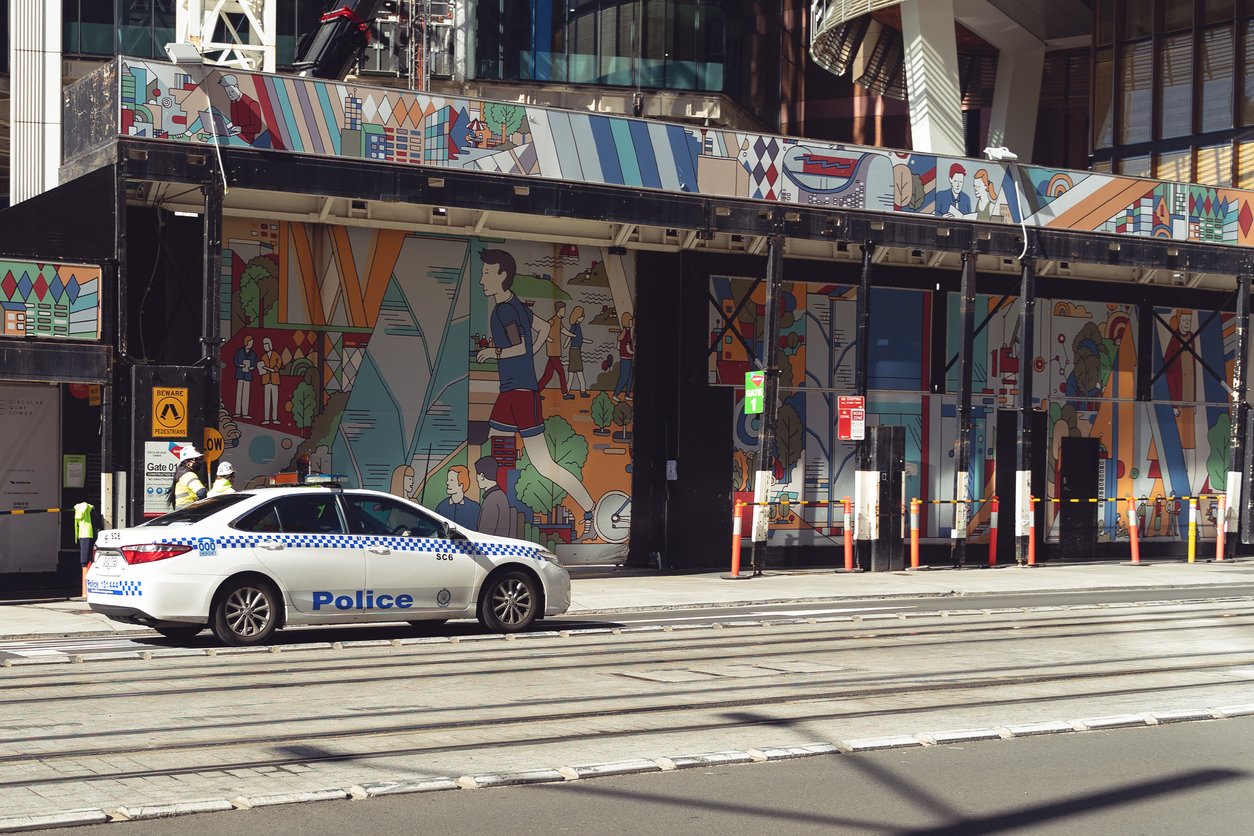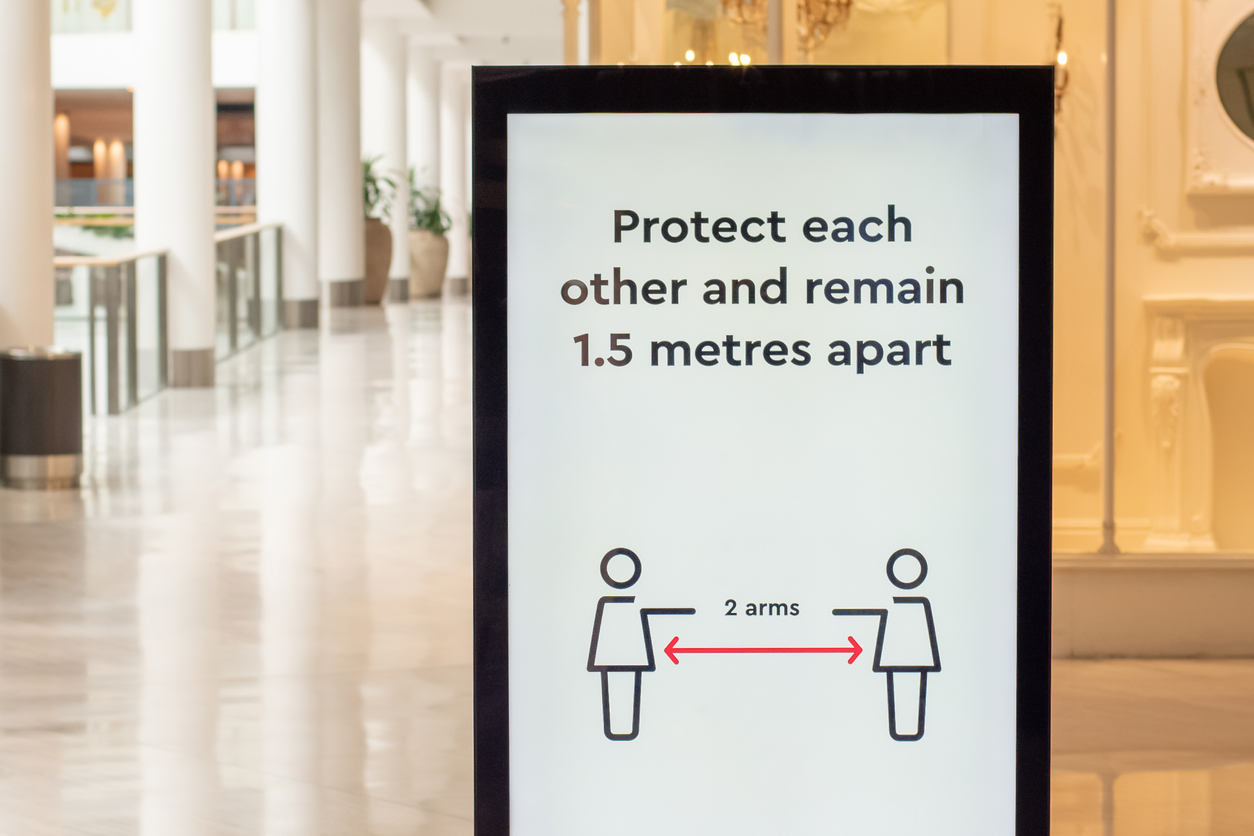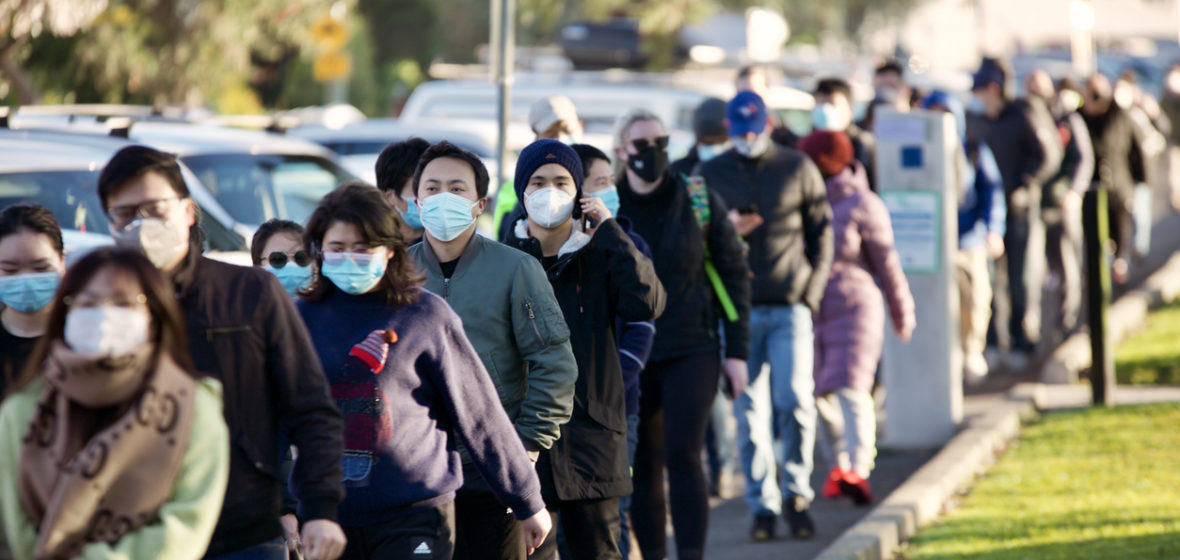It is no wonder that services like ours have found that many of the fines we are assisting clients with were issued contrary to law. It was just so hard to pin down what the law was at any moment in time.
As NSW continues to emerge from the pandemic, and the Government focuses on a return to “business as usual”, thousands of people across the state are still saddled with debt from fines. Legal practitioners are calling for a global solution to the millions of dollars that remain unpaid, and greater support for the vulnerable communities struggling to cope.
Tuning in to the NSW Government’s daily COVID-19 update became routine for many people during the pandemic, particularly in winter 2021 when restrictions were at their tightest.
High-level ministerial decisions were being made quickly in response to growing case numbers and an overwhelmed health system, which meant orders changed just as fast as the numbers – sometimes multiple times in a 24-hour period.
The NSW Government relied on a “punitive and policing” response to enforce restrictions, in the form of imposing fines. The legal profession rose to this challenge and saw a need for education. The Law Society of NSW, along with private firms and community legal centres, released regular updates on changes to restrictions and requirements.
Samantha Lee, senior solicitor with Redfern Legal Centre’s Police Accountability Practice, told LSJ it was “impossible” to try to keep up.
“Redfern Legal Centre put out fact sheets about the orders every week so that people could understand what the orders meant. It was exhausting. I’m glad we did it, because we identified huge problems with the fines system, particularly the review system,” Lee says.
“It was an administrative mess. We were trying to navigate it, other lawyers were too, and the police were trying to navigate it on the ground. Then you have the review system trying to make sense of any appeals coming in.”
Between the beginning of the pandemic in March 2020 and May 2022, almost 62,000 COVID-19 related fines (worth more than $65 million in revenue) were handed out by police, with alleged stay-at-home breaches comprising the majority. Just shy of 10,000 of those fines have been paid.
On-the-spot tickets ranged from $500 for smaller offences like failing to wear a mask to $1000, $3000 or $5000 for breaching stay-at-home orders.
The legal assistance sector saw a big wave of clients seeking advice about their COVID-related fines during the peak lockdown months of 2021. But services are now grappling with soaring demand again as unpaid fines fall into enforcement, with Revenue NSW starting to apply sanctions, including licence suspensions in many cases.

The Aboriginal Legal Service (ALS) established a designated fines service in October 2021, in response to the high number of clients impacted by COVID fines and charges. Coordinating Solicitor Lauren Stefanou says the Service has been overwhelmed by the sheer volume of fines issued contrary to law.
“It has become very obvious through all of our service provision around the COVID public health order offences that it was incredibly hard for police to stay up to date with what the changes were,” Stefanou tells LSJ.
“It is no wonder that services like ours have found that many of the fines we are assisting clients with were issued contrary to law. It was just so hard to pin down what the law was at any moment in time.
“I’m not criticising individuals for not being up to date with the law; it was hard for all of us … But when Government has relied so heavily on this law enforcement approach to public health order compliance, it clearly becomes problematic when these fines have been issued, many without a lawful basis. And so many of them, we know from the statistics, have been issued to people who have no hope of paying them.”
 Lauren Stefanou, coordinating solicitor ALS fines service
Lauren Stefanou, coordinating solicitor ALS fines service
The need for police accountability
In August 2021, a video emerged of then NSW Police Commissioner Mick Fuller addressing the force, telling officers they wouldn’t be held accountable for wrongly issuing a COVID fine during a blitz on lockdown breaches.
“I appreciate there’s a lot to take in with the health orders, but I am asking you to put community policing to the side for a short period of time. For 21 days I will head this operation; you need to take a strong approach to enforcement,” Fuller said in the video message.
“I have said before if you write a ticket and you get it wrong, I understand, and I won’t hold you to account for that. We have to shape the behaviour of people to get out of lockdown, and I know all of us want to be out of lockdown by Christmas, so please take the challenge.
“We need to stretch ourselves across the state, but we’ll only get compliance if you start writing tickets, if you start future CANing [issuing a court attendance notice] people for breaching the health orders.”
These comments caused a public outcry, and the fallout was felt by solicitors working hard to support clients on top of dealing with the already complicated nature of changing public health orders.
The Public Interest Advocacy Centre (PIAC) is committed to ensuring police exercise their powers fairly, and CEO Jonathon Hunyor says accountability needs to be paramount during a crisis.
“Effective public health responses rely on the community to have a high degree of trust in authorities,” Hunyor tells LSJ.
“To have had the Commissioner at the time suggest that police didn’t need to worry about accountability, and to have an approach that was ‘fine first ask questions later’, that really undermines public trust.
“For the disadvantaged communities that really felt the brunt of pandemic policing, to feel targeted is corrosive and unhelpful. When what we actually need is for everyone to engage, cooperate and work together.”
 Jonathon Hunyer, CEO Public Interest Advocacy Centre
Jonathon Hunyer, CEO Public Interest Advocacy Centre
Effective public health responses rely on the community to have a high degree of trust in authorities.
Hunyor questions how appropriate it was to be fining in the first place. PIAC supports public health measures and keeping the community safe and agrees with fining someone who “flagrantly breaches the orders” multiple times on different days. However, in all the circumstances where a person has been fined during a single interaction with police, the organisation supports converting the notice to a caution instead.
“Mostly on the spot fines are issued for regulatory offences like speeding or drink driving, where it is relatively clear whether you did it or not. You are either going 75km/h or you aren’t,” Hunyor explains.
“Here we have issues about what is a reasonable excuse, what is recreation? Were you actually aware of the order that was issued?
“Then there is an issue about the amount of the fines … Then we have poor awareness clearly among some police officers about the elements of the offence. Then we have the direction from the Commissioner to issue fines liberally. There was a deliberate strategy to fine without the care we think is necessary in making someone suffer a penalty”.
According to data from Revenue NSW, police handed out 42 cautions since March 2020, compared to the tens of thousands of fines issued.
The ALS and Redfern Legal Centre share PIAC’s view that outstanding unpaid COVID fines should be converted to formal cautions under NSW’s Fines Act 1996, to address poor administration that made it unclear which fines were given out according to law and which ones were not.
“Realistically, warnings and formal cautions were available to police just as easily as fines. Yet we overwhelmingly see that discretion exercised to hand out fines instead of warnings,” Stefanou says.
“From the beginning, the unfairness was written on the wall.”

A look at the review process
According to Stefanou, the “vague” and “non-specific” nature of the fines handed out by police during the pandemic has created an additional challenge for solicitors, with many bewildered by the ambiguity.
“The majority of $1000 tickets that were issued to clients I’ve assisted were for ‘fail to comply with noticed direction section 7/8/9 public health act COVID-19 individual’,” Stefanou says.
“The problem is that the Ministerial directions enforced, the ones that were applicable to all of us (or to sections of the population, depending on where you lived), were made pursuant to those sections of the Public Health Act. But there were so much detail and complexity in the contents of those directions that it was just impossible to decipher from the information on a penalty notice what the alleged conduct was.”
There are two avenues for appealing COVID-related fines: an internal review with Revenue NSW or court election, which is ultimately fraught with risks, Lee says. She is representing numerous clients in the local court, has engaged in high level discussions with Revenue NSW about Redfern Legal Centre’s concerns regarding fines, and has written to the Premier.
“We are doing everything we can to try and get some justice,” she says.
Most notably, Lee is representing three plaintiffs in an administrative law case filed in the Supreme Court in July, brought against the NSW Police Commissioner and the Commissioner of Fines Administration.
The clients all received fines ranging from $1000 to $3000 during the 2021 lockdown for allegedly breaching stay-at-home orders. The plaintiffs will argue that their fines are not valid because the penalty notices do not provide enough detail, as required under the Fines Act.
One of the plaintiffs, who has now had their fine withdrawn after two failed reviews, was sitting in a park in August 2021 when police issued a fine because the plaintiff was not “actively exercising”. In that same month, NSW Health clarified that “sitting for relaxation” was considered outdoor recreation.
“The difficulty with these fines is that people didn’t even know what the police had to prove. Because the fines were so vague and non-specific, they didn’t even know how to appeal, even if they were going to take it to court,” Lee says.
“Policing impacted on a wide range of people, from all areas. Those that never had any interaction with the justice system before were suddenly in this position where they had been issued with a fine and had to navigate the system. In some ways, it meant that people were more aware of police accountability and the need for our practice.
“During a crisis, it is so important that the rule of law is adhered to. The thing that keeps a democracy going is making sure the rule of law is applied correctly.”
 Samantha Lee, Redfern Legal Centre's Police Accountability Practice
Samantha Lee, Redfern Legal Centre's Police Accountability Practice
During a crisis, it is so important that the rule of law is adhered to. The thing that keeps a democracy going is making sure the rule of law is applied correctly.
Revenue NSW data also reveals that since the start of the pandemic 3000 people have elected to appeal their COVID fines in court. Half of those were issued in August 2021, during the strictest months of public health orders. If a plaintiff is unsuccessful in their court appeal, they face a maximum penalty of $11,000 or six months in prison.
Stefanou tells LSJ that penalty notices put the onus on the individual to challenge unfairly issued fines, which is not realistic for people from disadvantaged communities.
“We are urging people to talk to us before court electing because, yes, challenging the fines at court may yield a good outcome for some, [but] that requires someone who has the agency to advocate for themselves and to try to negotiate with police to have the fine withdrawn. That is just not realistic for so many impacted individuals,” she says.
“It is a real criminal offence when it goes to court, and they could incur a criminal conviction. Most of the clients referred to us who court elected and went to court on their own have a criminal record now.”
Though Stefanou respects the work that Revenue NSW is doing with hardship options and individual responses, she says this is not the right approach and global action needs to be taken.
“One of the issues with the fine review system, or even the hardship options that are available to vulnerable clients, is that it requires them to pick up the phone and call Revenue NSW. Requiring vulnerable people to pick up the phone and seek relief on a case-by-case basis is unrealistic when you are talking about 45,000 unpaid fines out there,” she says.
“The review process that is available hasn’t delivered justice for those people.
“When you think about the number of unpaid fines out there, the number of clients we can reach is a drop in the ocean.”

Levelling the playing field
President of the Law Society of NSW Joanne van der Plaat wrote to the Premier, Attorney General and Ministers for Finance and Aboriginal Affairs in May, imploring them to look at the “disproportionate burden” COVID fines have on the communities that can least afford them.
“Many of the top fifteen per-capita locations where fines were issued during the Delta outbreak have high Aboriginal populations. These include the top three of Walgett, Brewarrina and Wilcannia,” van der Plaat said.
“Eleven of these communities are counted among communities suffering the state’s highest level of social disadvantage.”
Stefanou and the team at the ALS assisted many clients in low socio-economic areas fined for going to buy groceries or carpooling with someone from another household, which was contrary to the direction at the time.
“We are state-wide, and our fines service is state-wide. A lot of our clients in regional and remote areas rely on other people for communal transport,” Stefanou says.
“Many of our clients already had fine debt … a lot of them don’t have a fixed address or they don’t have ready access to a phone or internet; there’s a lot of reasons why they may not even be aware they have received a fine.
“These areas are already subject to over-policing. The high dollar values of these fines made it easy to see very quickly where that fine debt was ballooning.”
The ALS, Redfern Legal Service and PIAC agree that, while the NSW Government is pushing for a return to “business as usual” and focusing on getting the economy back up and running, many clients in extreme financial hardship cannot move on with thousands of dollars of fines hanging over their heads.
“There is the old saying that if you have a hammer, everything looks like a nail. And sadly, we just keep investing in hammers,” Hunyor says.
“We keep spending more and more money on police and punitive responses and prisons, and it means when we have a social issue, a public health issue, we reflexively reach for these responses.
“Our community is still recovering from the social and economic impacts of the pandemic and lockdowns. We are far from being out of the woods yet.
“Shouldn’t we be letting people get on with that? Getting back to work, be taking care of their families and not feeling under economic pressure?”




